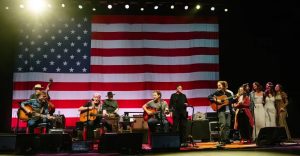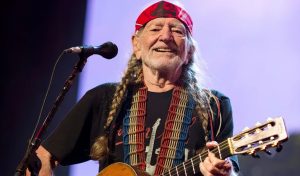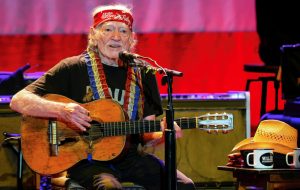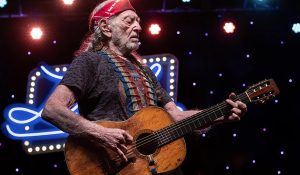A night of music, memory, and magic — as generations rise to honor a living legend.
In Phoenix, Arizona, on a warm spring night beneath the stars, Willie Nelson, now 92 years old, took the stage at the 2025 Outlaw Music Festival. And what unfolded was not just a concert — it was a love letter to one of the most iconic, enduring voices in American music history.
Known for his poetic honesty, outlaw spirit, and deep Texas roots, Willie didn’t need to announce anything that night. He simply showed up — guitar in hand, signature braids under his cowboy hat — and let the music speak. And as it turned out, that music would speak for all of us.
🎶 A Performance That Felt Like a Farewell, Without Saying Goodbye
Willie’s set began the way it always does: humbly. No big intro, no special effects. Just the quiet strum of Trigger, his beloved, battle-worn guitar. He moved through classics like “On the Road Again”, “Blue Eyes Crying in the Rain”, and “Always on My Mind” — each lyric carrying decades of history, heartbreak, and healing.
There was something different in the air. A collective awareness. A reverence. Every pause in his voice felt heavier, more meaningful. As if the audience understood, even without words, that this wasn’t just another tour stop. This was a sacred space in time.
And then — as the final note of his last song faded into the desert wind — the crowd did something unforgettable.
They stood.
And they clapped.
And they didn’t stop for over eight full minutes.

💔 The Tears of a Legend
At first, Willie smiled. He nodded softly. But as the ovation stretched on — as cheers turned into roaring waves of gratitude — he slowly stepped back from the mic, his shoulders trembling.
A moment passed. Then another.
And then — he wiped his eyes.
For the first time that night, Willie Nelson — the man who’s weathered six decades of tours, tragedies, triumphs, and timeless records — cried on stage.
It was as if a lifetime of songs, sacrifice, and quiet resilience was finally being met with the one thing artists don’t always get while they’re still alive: a true, heartfelt thank-you.

🌟 A Bridge Between Generations
Joining him onstage for the finale were three rising stars who’ve each carved their place in roots music: Billy Strings, Sierra Hull, and Lily Meola. Their presence wasn’t just a musical decision — it was symbolic.
This wasn’t a torch being passed. It was a circle being completed.
Billy Strings’ blazing guitar runs met Sierra Hull’s elegant mandolin and Lily Meola’s velvet vocals. And in the center stood Willie, bridging generations of country, folk, and Americana, not with dominance — but with dignity.
“It felt like singing beside a grandfather, a teacher, and a friend all at once,” Sierra later said in an interview. “There was no ego. Just grace.”
🌅 A Tribute Written in Applause
What made this ovation different wasn’t just the length — it was the meaning behind every clap. This was for the miles traveled on tour buses. For the nights he sang through pain. For the way he made listeners feel seen, loved, and understood — without ever having met them.
Willie Nelson is a man who never asked for applause. He just gave us music. And in Phoenix, 20,000 people gave it all back.

“I’ve seen standing ovations,” one longtime fan said, “but I’ve never seen one become a prayer. That’s what this was — a prayer of thanks.”
🎤 Final Notes — But Not the Final Song
As Willie quietly walked offstage that night, he left behind more than just an echo of melodies. He left behind a reminder:
That the greatest legacies aren’t built on awards or headlines. They’re built on how you make people feel — across generations, across heartaches, across time.
And as long as someone’s driving across the plains with the windows down, or dancing barefoot in a kitchen to “Blue Eyes Crying in the Rain”, or whispering a Willie lyric to get through something hard — his voice will live on.
